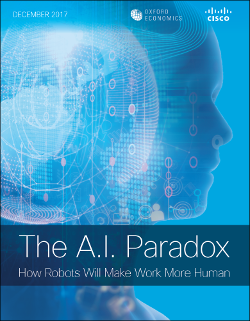Ungated Post | 26 Feb 2018
The AI Paradox – How robots are making work more human

Over the next decade, a great wave of technological change will wash through the economy, transforming the nature of work and the shape of the labour market. We collaborated with Cisco to study the implications of these trends on jobs over the next decade. Our results are based on a brand-new, multi-layered modelling framework, that enables us to simulate the real-world dynamics of technological change and its interaction with the world of work.
We found that 6.5 million US workers will have to seek out a new profession over the next decade. Workers in transport, lower-level manufacturing and agriculture jobs will face a difficult time. Meanwhile, we see new jobs emerging in other areas, such as computing, management and media, as well as in healthcare and sales.
The Oxford Economics Skills Matching Model is used to help us simulate the job-moves workers will make in response to a shift in the nature of work. What emerges are signs the US is facing a significant reskilling challenge. There are acute ICT skills shortfall to overcome and, paradoxically, as technology becomes more capable it is "human skills" that explain much of the gap between today’s workforce and the needs of the future.
Oxford Economics’ team is expert at applying advanced economic tools that provide valuable insights into today’s most pressing business, financial, and policy issues.
To find out more about our capabilities, contact:
Americas
Diantha Redd
+1 (646) 503 3052
Email
Asia Pacific
Peter Suomi
+65 6850 0110
Email
EMEA
Aoife Pearson
+44 (0)203 910 8054
Email
Related Services

Post
KPMG M&A Outlook 2026: Between Uncertainty, Resilience, and Seizing Opportunities
Discover how Germany’s M&A landscape is evolving – with a focus on growth, AI and post-merger value creation.
Find Out More
Post
Silver, the next generation metal
This report highlights the critical role silver plays in data centres and artificial intelligence (AI), automotive and electric vehicles (EVs), and solar energy photovoltaics (PVs). With these sectors expected to expand significantly over the coming years, we expect future silver demand to be strong.
Find Out More
Post
Powering the UK Data Boom: The Nuclear Solution to the UK’s Data Centre Energy Crunch
The UK’s data centre sector is expanding rapidly as digitalisation, cloud computing, and artificial intelligence (AI) drive surging demand for high-performance computing infrastructure.
Find Out More